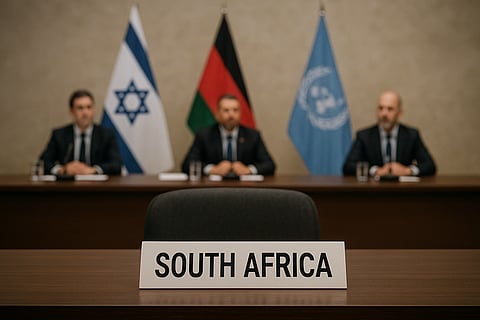South Africa left out as Middle East peace takes centre stage: Kenneth Mokgatlhe
Key topics:
Israel-Hamas ceasefire ends 2-year conflict, Trump praised for leadership
South Africa missed chance to mediate due to anti-Israel stance
Peace crucial for Middle East stability, Africa, and global influence
Sign up for your early morning brew of the BizNews Insider to keep you up to speed with the content that matters. The newsletter will land in your inbox at 5:30am weekdays. Register here.
Support South Africa’s bastion of independent journalism, offering balanced insights on investments, business, and the political economy, by joining BizNews Premium. Register here.
If you prefer WhatsApp for updates, sign up to the BizNews channel here.
By Kenneth Mokgatlhe*
It was a jovial moment days ago when Israel and Hamas agreed to a ceasefire, which would end the 2 year long conflict that shaped the political and social atmosphere in the Middle East region and beyond. It is quite disappointing that South Africa was never involved in the search for compromise and negotiations for this bloody conflict, which left scores of casualties on both sides. This conflict drastically disrupted the livelihoods of people in the State of Israel and the Palestinian Territories.
It was not only heroic but brave of President Trump of the United States to demonstrate decisive leadership to end the Israel-Hamas conflict and bring about peace and hope, which may spread throughout the region. This peace deal has the potential to bring about security and stability across the Middle East, including in other war-torn countries such as Syria, Yemen, Iraq, and Lebanon. It has to be given a chance to thrive.
South Africa missed a golden opportunity to be part of the peace-advocates, such as the US, Qatar, Egypt, and the United Arab Emirates, who all played a significant role in the realization of the peace deal. The South African government, under the ANC’s majority rule, has adopted an anti-Israel policy, which at times clouds its judgment on the longest Israel-Palestine impasse. They have fixed their thinking and position in this conflict, where they always blame, target, and accuse Israel of provoking Hamas, an organization declared a terrorist organization by several countries.
Read more:
The anti-Israel policy adopted by South Africa led to the decision by Pretoria to drag Israel into the UN’s International Court of Justice (ICJ). This decision, ever taken, was a further attempt at villifying Israel rather than focusing on ways to end the conflict and bring the two warring sides together. The ANC’s focus is misdirected as it wants to identify the problem, but is not interested in sourcing the solution to the problem it has detected.
The Israel-Palestine conflict is one of the most complex impasses in our history, which is shaped by competing national claims, religion, politics, economy, and territory. It is for that reason that South Africa has to acknowledge these realities and focus on bringing about a permanent end to the conflict, peace, and social cohesion among these two people who do not hate each other.
South Africa is reputable, respected, and known to be a peace-loving and negotiation master, as it demonstrated its ability to pursue peace through negotiations with distinction in the early 1990s following the release of the country’s father of the nation, Nelson Mandela. It was Mandela’s leadership that saved the country from a possible civil war between the white and black populations. He became a symbol of peace when he created an inclusive government in 1994 and embarked on initiatives to achieve nation-building. It is this experience that has established South Africa as the most respected player in the international community; what a pity that it has squandered this position through its narrow political desire to demonize one side. South Africa’s choice of optics over peace-building has led to it becoming insignificant, as it has been left out of the room during peace talks on the African continent.
South Africa should learn from a small but influential country such as Qatar on the global discourse, on how they have been involved in the peace deals in the Democratic Republic of Congo, Darfur, Yemen, Israel-Hamas, and many other complex conflicts around the world. Pretoria stands out as a master negotiator, not an aggressor who is interested in the continuation of wars around the world.
South Africa, as Africa’s most powerful nation, could have used its influence to peacefully end the conflict between Hamas and Israel. This could have been easier because it has established key communication channels with Hamas, and Israel is always available through diplomatic channels. It should be easy to sit the warring sides around the table and bring them together without obsessing on who is guilty or who should be punished.
Read more:
South Africa should reclaim its position in the global discourse rather than grandstanding for mere political and electoral mileage. This influence could be used to preach peace around the world, especially in Africa and the Middle East regions, which are deeply affected by these wars, which are a hindrance to economic development and progress. It is widely known that the major prerequisite of national development is security, stability, and safety. No country will develop in the middle of the conflict. Peace will always be accompanied by economic fortunes and prosperity, an end to the sufferings.
*Mokgatlhe is a fellow at the Middle East Africa Research Institute (MEARI)

